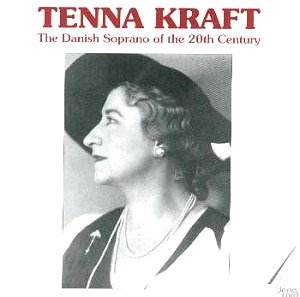AVAILABILITY
www.danacord.dk
UK: Discovery Records: Tel: 01380 728000, Fax: 01380 722244, E-mail:
info@discovery-records.com
Danish soprano Tenna Kraft’s long and impressive
recording career stretches back to pre-electrical recording days
and covers the majority of the first half of the 20th century.
Tenna Frederiksen Kraft was considered by many to be the most
gifted Danish female singer of the 20th century.
The lyric-dramatic soprano was employed by the
Royal Theatre, in Copenhagen from 1906 to 1939 and became the
theatre’s prima donna absoluta, taking many leading roles
in operas by Verdi, Puccini and Wagner et al. It was said
that not only was Kraft a great soprano, but she was also an outstanding
actress; particularly suited to the demands of the parts of Violetta,
Tosca and Butterfly and also comic roles such as Despina.
When visiting Denmark in 1932 conductor Fritz
Busch heard Tenna Kraft for the first time and said, "How
is it possible to hide such an artist from Europe?" It was
explained that Kraft had never learned any languages other than
Danish and as was the custom of the time she sang all her parts
in her mother tongue. In addition Kraft suffered from terrible
stage fright, a condition that grew worse as she grew older.
The comprehensive booklet notes with this historical
Danacord release are a mine of information. Interestingly they
detail early 20th century recording techniques and the difficulties
experienced with sound quality. On this recording it is so very
easy to let the manifold problematic sound quality overshadow
the singer’s performance. We are informed how recording strings
to accompany Kraft was practically impossible in the pre-electrical
amplification era. The dynamic range of the music often exceeded
the capacity of the recording equipment and Kraft would have to
find techniques to modify her forte and pianissimo to
best fit inside the available range. In addition, as the volume
difference between the lower and upper registers of a women’s
voice is wider than a male voice it is more difficult to record
successfully. Consequently Kraft’s forte passages often
blare-out as a result of feedback and her pianissimo is
often rendered almost inaudible. It is not surprising that only
in the selections from the 1934 HMV recording and the 1940 Odeon
recording do we hear the soprano’s voice at anywhere near her
finest.
I had never heard Tenna Kraft prior to receiving
this review copy and despite the acoustic reservations of listening
to historical recording, I found her voice extraordinarily moving.
Kraft seems to have the special quality of ease of vocal production
and carrying capacity; with a certain purity and evenness to her
voice. This recording, in spite of the most uneven sound quality,
is an astonishing historic legacy to Kraft’s art, particularly
her rich tones and lovely phrasing and her pure and golden timbre
that she clearly maintained throughout her career. The highlights
I feel are Kraft’s memorable performances of Schubert’s Ave
Maria and Puccini’s Un bel di, verdremo, from Madam
Butterfly and Vissi d’arte, from Tosca.
This Danacord release provides a marvellous glimpse
into the career of a soprano who was for so long Denmark’s hidden
gem. The recorded sound may prove too problematic for most. Strictly
for enthusiasts of historical recordings only.
Michael Cookson
see also review
by Jonathan Woolf


